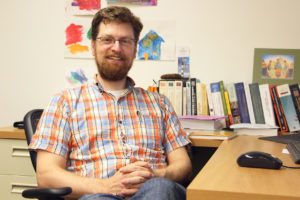In the Spring of 2017, Ryan Yates began his term as Houghton’s Assistant Professor of Computer Science and Data Science.
 Yates graduated from Wheaton College in 2003 with majors in computer science and mathematics. From there, he landed a job in the software industry, building computer aided design tools before further pursuing his academic career at the University of Rochester.
Yates graduated from Wheaton College in 2003 with majors in computer science and mathematics. From there, he landed a job in the software industry, building computer aided design tools before further pursuing his academic career at the University of Rochester.
“My area of research is in systems; in particular, synchronization,” Yates said. “Synchronization is how you manage multiple computers on the same chip all working together, and making it work to either improve speed or increase the scale of the problems we solve. The other half of my research is in the Haskell programming language which is a functional programming language that is different from others in its commitment to a mathematical approach to things.”
Combining these two areas, much of Yates’ current work has focused on improving the performance of transactional memory, which involves a compositional approach to solving problems. “In the industry I was working for, we encountered concurrency problems in managing computers that involved thinking about the whole system at once,” he said. “Transactional memory allows you to think about the small parts independently.”
Dr. Brandon Hoffman, Department Chair of Physics, Computer Science, and Engineering highlighted the strengths Yates brings to the program. “He is interested in a wide variety of fields that involve computer science, which is really important for data science because you’re applying it to anything, and he’s interested in applying it to anything,” Hoffman stated. “When you present him with a new application, he’s good at seeing the connections and he enjoys it.”
Morgan Smith ’19, a student who has been under Yates’ tutelage for several years, echoed Hoffman’s statement. “Yates is interested not only in developing valuable tools, but also in using and sharing those tools intelligently and respectfully. Computer scientists tend to retreat into their discipline and look down on what they perceive as the non-technical laity, while Yates seeks to help people with different skill sets contribute to and benefit from the discipline by prioritizing the social dimensions of technology,” Smith said. “This focus will help Yates produce excellent technologists and make him an ideal educator for students from other disciplines encountering computer and data science in Houghton’s new liberal arts courses.”
Since Yates has always valued getting to know people in an intentional way, he has adopted an interactive lecturing style in the classroom. “If I don’t get to know my students, I won’t get to know what things are just beyond their ability, and what is way beyond their ability,” he said. “I want to push them just beyond their ability, so they are constantly on the edge of learning.”
This focus has not gone unnoticed by many of his students, including Smith. “Yates combines technical expertise and pedagogical skill with humility and active concern for students,” she reflected. “In particular, I value the way he pushes students to think critically about the material they’re learning, helping them to understand why something’s designed a certain way by imagining and evaluating multiple possibilities together.”
To Yates, learning is personal. “I want every person to be aware of their own strengths and weaknesses, and I want to give them an opportunity for learning,” he said. “I want everyone’s learning experience to reach everybody, and in that vein, I also want to demonstrate my own learning and demonstrate things that are just beyond the edge of my understanding, and engage with students in those things.”
So what does “success” mean in the computer science classroom? “Getting to know better the material, and not just the ideas,” Yates said, “but also the place of those ideas in a bigger picture of the world.” He values discovering how the ideas are important to humanity, and to the world. “Each class should broaden your world in an interesting way,” he said. “You haven’t been successful in the classroom if you aren’t making connections to things outside of it.”
